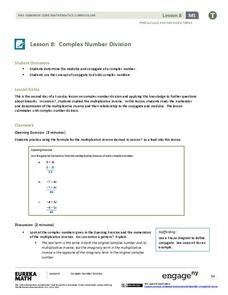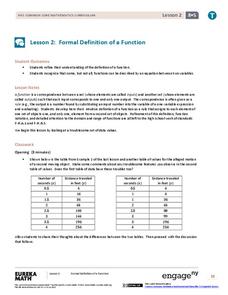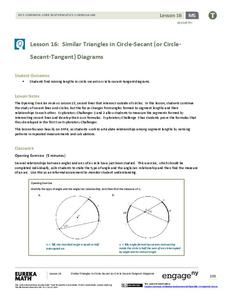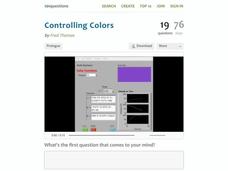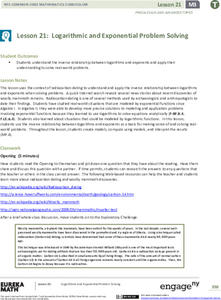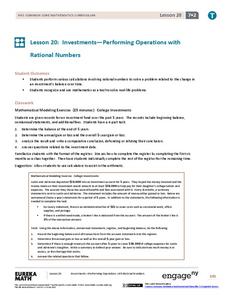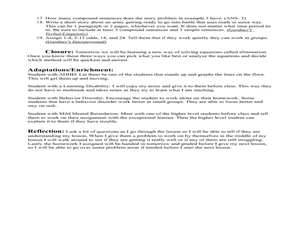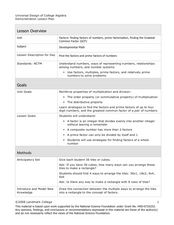EngageNY
Complex Number Division 2
Individuals learn to divide and conquer complex numbers with a little help from moduli and conjugates. In the second lesson on complex number division, the class takes a closer look at the numerator and denominator of the multiplicative...
EngageNY
Formal Definition of a Function
Formalize the notion of a function. Scholars continue their exploration of functions in the second lesson of the module. They consider functions as input-output machines and develop function rules for selected functions.
EngageNY
Using Linear Models in a Data Context
Practice using linear models to answer a question of interest. The 12th installment of a 16-part module combines many of the skills from previous lessons. It has scholars draw scatter plots and trend lines, develop linear models, and...
Curated OER
Science NetLinks: Adolescent Sleep
Wake up, sleepy head! High schoolers craft a creative presentation that represents how they feel when they wake up on a school morning. After the presentations, a reading of Academic Sleep Times and Academic Performance launches a...
EngageNY
Criterion for Perpendicularity
The Pythagorean Theorem is a geometry pupil's best friend! Learners explain the equation a1b1 + a2b2 = 0 for perpendicular segments using the Pythagorean Theorem. They are able to identify perpendicular segments using their...
EngageNY
Similar Triangles in Circle-Secant (or Circle-Secant-Tangent) Diagrams
First angle measures, now segment lengths. High schoolers first measure segments formed by secants that intersect interior to a circle, secants that intersect exterior to a circle, and a secant and a tangent that intersect exterior to a...
EngageNY
If–Then Moves with Integer Number Cards
Pairs with the same sum of integer cards verify the addition and subtraction properties of equality by adding and subtracting like cards to each hand. They also justify the multiplication and division properties of equality using...
Alabama Learning Exchange
Imaginary Numbers? What Do You Mean Imaginary?
Don't worry, this resource actually exists. Scholars learn about imaginary numbers and work on problems simplifying square roots of negative numbers. As an extension, they research the history of imaginary numbers.
Curated OER
Solving Equations Using Models
Explore mathematics by analyzing images. As they view pictures on the SMART Board, individuals must write corresponding algebraic equations. They utilize models to visualize the math expressions.
101 Questions
Controlling Colors
Control the computer processing speed with mathematics! Scholars use a computer program to graph color-changing functions. Using complex polynomial functions slows the speed of the program, but simplifying the expression allows the...
EngageNY
Logarithmic and Exponential Problem Solving
Just how old is it? The 22nd portion to a 23-part Precalculus unit uses radiocarbon dating and other exponential modeled real-world problems. Learners use the inverse relationship between logarithms and exponentials to solve the problem...
EngageNY
End-of-Module Assessment Task: Grade 7 Module 2
Learners demonstrate their ability to operate with rational numbers through a five-question assessment that includes questions ranging from simple operations with integers to solving two-step equations with rational coefficients.
EngageNY
Investments—Performing Operations with Rational Numbers
Partners fill out a register to record transactions on a college investment account. They use the amounts listed to calculate the running and current balance of the account, providing experience in adding and subtracting rational numbers.
Curated OER
Solving Systems Using Substitution
Write a math story for a series of problems using given variables. The class writes stories, showing understanding of strategies in compound sentences. They then solve the equations.
University of California
Student Workbook: Algebra and Functions
A smorgasbord of functions, this packet has the basics required for your learners to be successful in the land of early algebra. The packet includes solving equations, graphing, evaluating, simplifying and basically everything else...
Ahisma Summer Institute
The Power of One - Math in a Different Angle
In this 2-day lesson focused on exponents, middle schoolers will cross the curriculum by engaging in science, history and language arts activities. Exponential growth will be explored using grains of rice on a chess board. Exponential...
Curated OER
Find the Factors and Prime Factors
Show the class how to find the factors of numbers. They use a variety of strategies, including unifix cubes, to find the factors of a whole number. This resource includes clear procedure to follow. Included are an anticipatory set,...
Curated OER
Applying Properties to Variables
Eighth graders combine like terms in this properties of variables lesson. Using named items (stars, moons and hearts), they combine like terms using variables. They use the distributive property to combine like terms. Finally, they write...
Illustrative Mathematics
Egyptian Fractions II
The Egyptians used unit fractions to describe all other fractions. Your class will rewrite rational expressions in order to deduce information about rational numbers. The activity starts with specific fractions, guides you through a few...
Illustrative Mathematics
Watch Out for Parentheses 1
Parentheses are an important tool in the algebraic toolbox in regard to the structure of the algebraic equation. They are the beginning of the standard order of operations rule, the P in PEMDAS. The central question...
Curated OER
Identifying Terms, Factors, and Coefficients
What are terms, factors, and coefficients? This slideshow provides definitions and examples of various parts of algebraic expressions, and provides guided practice problems in writing and identifying parts of algebraic expressions for...
Curated OER
Talking About Your Name in Math Terms
Add imagination and creativity to your math lesson plan. Young mathematicians investigate ways to express their names in mathematical terms. For instance, they can count the number of letters, analyze the geometric shapes of the letters,...
Illustrative Mathematics
Rectangle Perimeter 1
Creating an expression to represent the perimeter of a rectangle is a fundamental beginning skill in learning how to use and define variables. This activity starts with the basics and can be followed up with additional tasks.
Curated OER
Working With Equations
High schoolers create a mathematical formula to help plan ration supplies for a polar expedition. Using basic algebra skills, students identify the variables in planning for rations. They create an equation to help plan the expedition....
